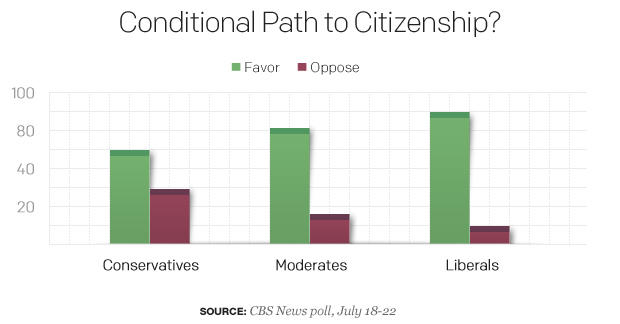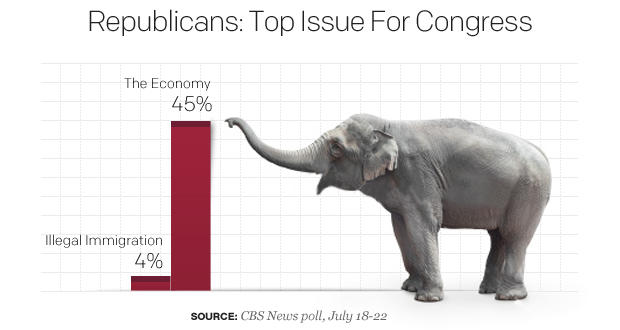Are the tides turning for immigration reform in the House?
It was only a week ago when prospects for the House passing broad immigration reform seemed dim. However, after hearing this week from House Republicans - not including Rep. Steve King, R-Iowa - and looking at new polling data, it seems that the tides may be turning.
Addressing the notion of immigration opposition funding primary challenges, a top Republican working to pass immigration reform told CBS News that reports of powerful and moneyed opposition to reform have been overblown.
"There's a false sense of the weight of the opposition," he said, adding that he thinks the opposition "is a paper tiger."
That analysis is more than just supposition. According to a recent analysis of political spending on immigration issue advertising, pro-immigration reform groups have outspent anti-reform groups by nearly 3-to-1, with the total spent by both sides through June still less than $10 million.
The money appears to be on the side of the supporters of reform ,and supporters believe the opposition won't have the kind of money needed to run serious challenges against House Republicans who support reform. Additionally, one of the biggest outside Republican groups that has previously been engaged in Republican primaries, the Club for Growth, hasn't taken a position on immigration reform, and instead is focused on spending and health care.
This week supporters of reform were helped, in an odd twist, by controversial comments from the opposition that gave pro-reform House members a chance to draw the line - which they quickly took. King made headlines by taking aim at the idea of citizenship for children of illegal immigrants. "For every one who's a valedictorian," said the Iowa Republican, "there's another 100 out there that weigh 130 pounds and they've got calves the size of cantaloupes because they're hauling 75 pounds of marijuana across the desert."
The comments drew quick condemnation. At a meeting of conservative Republicans, Idaho's Rep. Raul Labrador, a key voice on the issue, called the remarks "irresponsible and reprehensible" and "out of touch with the republican conference."
Those comments and others had the effect of marginalizing the opposition to the extremes of the party, says a Democrat working on reform efforts. And it's given more moderate Republicans cover to support it.
Meanwhile the latest CBS News poll showed conservative opposition to reform and to a path to citizenship is not really materializing. Much as they did this spring, seven in ten conservatives are willing to accept a "path to citizenship" for undocumented immigrants with conditions. They're not as supportive as liberals, but they're mostly supportive nonetheless.
A critical part of the GOP base, evangelical Christians, also support a path to citizenship (75 percent) taking cues from some of the community's leadership - which may further inoculate House members.
And a poll released last week by a Republican pro-reform group interviewed Republican primary voters specifically, and also found willingness to accept a path to citizenship, and not much fervor for opposition.
"A solid 65 percent majority of Republicans support a pathway to citizenship for illegal immigrants if it is coupled with substantially increased border security," according to the poll by Americans for a Conservative Direction.
Still, hurdles remain.
One of the biggest ways House Republicans may inoculate themselves is by addressing border security - as they define it - first, before addressing any sort of path to citizenship. For the most part those Republicans balk at the nearly $40 billion security package that passed the Senate because it didn't do enough to verify border security.
The security issue also gives the GOP conference a chance to press their very real mistrust of the Obama administration, which is both a policy concern for them and also a stance that will surely find resonance back home. Some Republicans caution they don't think the administration will follow through on enforcing any new border laws, and the recent delay of the employer mandate element of the president's health care law fuels that fire.
"The president has a lot of problems - the biggest is that the American people have lost faith that the federal government will do what it says it will do," said Rep. Steve Southerland, R-Fla. The administration, he said, has "an integrity issue" and that "not even his base believes he will honor his word."
Another Republican, California's Rep. Tom McClintock was even more direct. "I don't believe the federal government is interested in enforcing border security laws now on the books...I don't believe it has interest in enforcing stronger border security laws in the future"
That lack of trust could be a wrench in the works, say reform backers. "People are going willing to swallow path to citizenship of they believe border will be secured," said the Republican strategist working to pass immigration reform.
Here, they are very much in step with rank-and-file conservatives (which may again explain the lack of resistance) two-thirds of whom would do the same, favoring a border-first approach in the poll, if asked to choose.
But there's disagreement, and there's passionate opposition, and those two are very different. One of the biggest reasons immigration or the border may not be striking a chord in the end is - as always - the economy. Americans of all stripes don't feel Congress is addressing it, but should be. That frustration may be trumping any single, specific policy at this point.
To wit: In the latest CBS News poll, conservatives' and Republicans' top priority for Congress is the economy, and that's the same as everyone else.
Compare this to views on the Affordable Care Act, another topic where the House has focused energy: 60 percent of conservatives want the whole law repealed, far more than the general population. In that regard, when the House acts, it's clear they're doing what their voters want (whether or not it's futile is another matter.)
The next test, though, is the calendar: In August members of Congress go home on recess and all eyes will be on town hall meetings where - if the past is any guide - some members will meet up with their most impassioned constituents. Sometimes those exchanges can rally sentiment or, perhaps, at least appear to over-inflate what sentiment there is.
In 2009, the once-mundane town halls captured national attention as members ran into an organized, vocal, and sometimes belligerent opposition to the president's push for health care reform. On the other hand, that bitter health care debate set the bar so high, that any less vehement opposition to immigration now might seem like smooth sailing.
"I really don't see mass organic anger toward immigration reform," said the Republican strategist who's involved with the immigration debate - not like that very "mass organic anger" that drove the narrative of Americans' opposition to health reform. Supporters of reform see that lack of that mass opposition clearly as an advantage.
At least for now.


